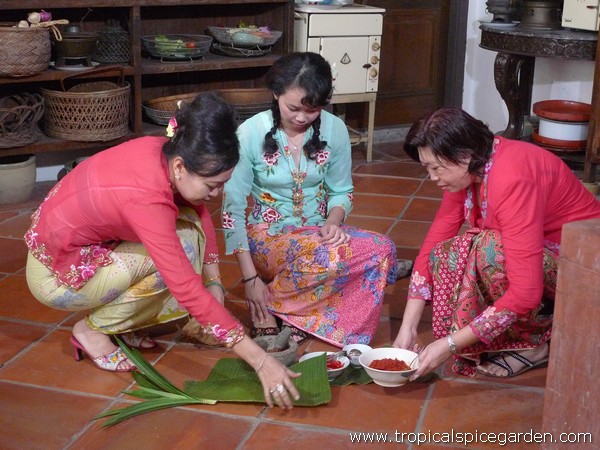Malaysia, November 6, 2016: When Lee Su Pei met a charming gentleman by the name of Jerry Kong in their hometown of Penang, Malaysia, her cooking skills were limited at best. When she realised Jerry came from a family skilled in Nyonya cuisine, she knew a long, hard road lay ahead if she wanted to keep dating him and eventually be part of his family.
In the 16th Century, the intermarriage of Chinese immigrants and local Malays resulted in the distinctive culture of Straits Chinese Peranakan, whose language, clothing, art and cooking are celebrated to this day. Their unique fusion food – a wonderful combination of Chinese cuisine with influences from Malays, Indians, Thais, Indonesians, Dutch, Portuguese and English – is concocted using spices like chillies, turmeric, ginger, star anise and cloves, and local leaves such as daun kesum, daun kaduk and daun cekok.
But while the deep and varied flavours are undeniable, it’s the incredibly precise techniques required to create them that gives Nyonya cooking its celebrated status within Peranakan communities.
Peranakan men address themselves as Baba (uncle), while women are called Nyonya (auntie) – and it’s no coincidence that the spicy, piquant cuisine is named after the females. The matriarchal recipes are passed down from generation to generation, and are expected to be mastered by the women in the family.
“All our recipes are from memory,†the now Nyonya Su Pei told me. “The recipes are passed down orally, so when you cook beside a matriarch they will basically tell you the recipe on the spot.â€
“The Nyonyas can spontaneously replicate recipes taught by matriarchs whenever they step into the kitchen,†Baba Jerry, her husband and business partner, added. “Each matriarch has her own distinct taste notes, fondly remembered by family members. My grandma’s last words to Su Pei and me were, ‘Cook with your heart and passion, the ones tasting your food will feel you. Cooking is the legacy of our family.’
Under the strict supervision of her grandmother-in-law and mother-in-law, Nyonya Su Pei went through “military trainingâ€, where she learned everything from scratch and committed more than 500 recipes to memory.
“Their cooking techniques were so secretive, I thought I was working for the CIA!†she remembered with a chuckle.
Seemingly straightforward dishes like nasi ulam, or herbal rice, required a precise blend of more than 18 herbs and spices measured by eye, pounded by mortar and pestle and mixed by hand to ensure the perfect temperature and consistency of the rice. Simple proteins like grilled fish were taken up a notch by being wrapped in banana leaves and grilled under hot charcoal to preserve the aromatics, and served with lam chut, a sour, spicy sauce made from calamansi limes (juiced by hand, of course) and a specific type of belachan, or shrimp paste.
“The motherly recipes had to be emulated perfectly,†Nyonya Su Pei recalled. “If the food wasn’t up to par, the men in the family would just leave the dining table. I felt disheartened after a whole day of toil in which nobody appreciated my food. They boycotted it.â€
“Nyonya cooking evolved in home kitchens where family cooks held absolute sway,†explained writer and Nyonya cookbook author Baba Christopher Tan. “Being able to prepare magnificent food was considered social capital.â€
Shortcuts like using juicers and blenders, which are believed to compromise flavours, are strictly forbidden. Instead, coconut milk is squeezed from the meat by hand, and spice pastes are pounded in a mortar and pestle.
Add to this the variation in recipes, the intensity of training and the oral recipe sharing, and the result is that Nyonya cuisine is slowly dying with each generation that refuses to take the time to learn it.
In a similar effort to promote and share Nyonya cooking culture, Baba Christopher’s most recent cookbook combines Peranakan flavours with Western baking techniques and equipment. And along with many of his contemporaries, Baba Christopher speaks on culinary panels, hosts local community events and uses social media to celebrate Nyonya cuisine.
“As guardians of the Nyonya cooking, we strongly believe that we must embrace change, technology and ideas,†Baba Jerry said. “A culture that does not change is a dead one. The cooking and recipes must be applied to contemporary life, practiced and shared.â€
A living example of this is Nyonya Yong Yee, Nyonya Su Pei and Baba Jerry’s 17-year-old daughter, who is now learning to cook various Nyonya dishes.
“It’s important to be soft and kind, but resilient in the kitchen,†Nyonya Yong Yee said. “If I were to have children, I’d hope to pass Nyonya cooking to them. I’d want them to understand the Baba-Nyonya values, honour the elders and cherish every part of the culture.â€
“None of my friends are interested in learning Nyonya cooking,†she added. “They would rather eat out.â€
By Julie Bensman
Â







